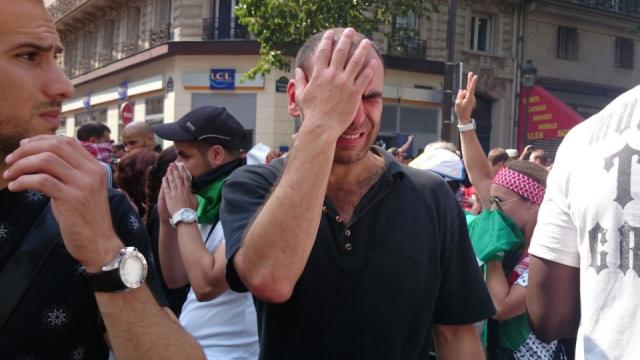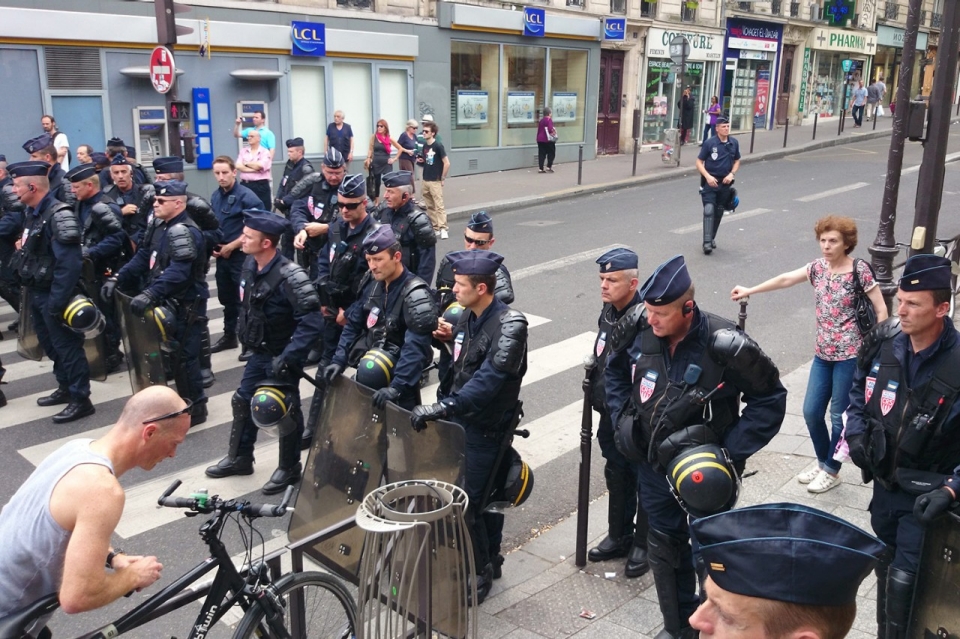
Paris police on Saturday besieged protesters who violated a citywide ban on pro-Palestine demonstrations. Organizers of the protests said the police crackdown was aimed at further disenfranchizing the nation’s often politically and socially marginalized Arab and Muslim communities.
“The police attacked us,” Amelle El Amraoui, 28, said from the streets of the protest. Despite the ban, imposed the day before, Amraoui defiantly joined the demonstration that sought to decry the ongoing invasion of the Gaza Strip, which has left at least 333 Palestinians dead over 12 days. Five Israelis have also been killed in the conflict.
At least 35 of the roughly 5,000 protesters who flouted Paris’s freshly imposed protest ban were arrested, organizers said. Numerous others were injured, they said, when police charged them with teargas and Tasers.
Amraoui said that one protester had been stabbed by a gang of political opponents. Paris police were not immediately available for comment.
Local French media reported that protesters had thrown projectiles at police and characterized Saturday’s events as race riots, but protesters charge that the police were attempting to provoke violence to legitimize their restriction of French Arabs’ freedom of expression.
“The demonstration started out peacefully, and then the police started throwing gas bombs,” said Houria Bouteldja, one of the organizers and a spokeswoman for the anti-racist political movement Les Indigenes de la Republique — The Indigenous of the Republic.
“They are trying to invent a reason to continue to ban the demonstration,” said Mehdi Meftah, another protest organizer.
Netherlands based European Decolonial Network started a petition on Saturday to preserve the protesters' right to demonstrate. The petition has garnered nearly 370 signatures from across Europe, North Africa and the United States.
For many at the protest, images of the police cracking down on French Arabs defying the law to decry what they say is imperialism harkened back to the Parisian police’s infamous crackdown on demonstrations for Algerian independence in the 1960s. On Oct. 17, 1961, during one of those protests, police shot what some historians say was well over 200 protesters and buried them in mass graves.
“Right now everyone has a smartphone. Everyone has camera. They can't use the same violence — they can't throw us in the Seine," Meftah said. "The similarity here is that the Arab, the Muslim and the black is going to public and expressing solidarity with a people under siege — and there's a continuation of colonial policies of repression.”
“Of course we can’t compare the scale of the violence,” said Aya Ramadan, another protester. “But it's evident that today when we see a mass of Arabs and black people coming together over the Palestinian cause, it's an image that's reminiscent of the images in the '60s. It's relatively the same thing: Arabs supporting an independence movement abroad. And they face violent repression.”
The move to ban the protests followed calls from Jewish community leaders, who asked that authorities ban “pro-Hamas” rallies launched last Sunday, which they have characterized as racist.
Synagogues and Jewish businesses around the city have been vandalized in recent protests, Jewish leaders said, by people associated with the pro-Palestine demonstrations. But protest-supporters point out that the demonstrations are not intended to be about race.
“Among those who participated in the demonstrations was the Union Juive Française Pour la Paix (UJFP),” said a lawyer who launched an appeal to the Parisian police's decision, Hosni Maati, referring to a Jewish organization advocating for Palestinian sovereignty.
Pro-Palestine protesters, according to local media, were attacked by members of the far-right group the Jewish Defense League (JDL), which often advocates the use of force against Palestinians and their supporters. The JDL was described as a "right-wing terrorist group" in a report by the FBI from 2000–01.
After protests on Sunday, French Prime Minister Manuel Valls said that France “will not tolerate attempts to — with violence, words or acts — import the Israeli-Palestinian conflict onto its soil.”
Although some indicated that the demonstrators felt disheartened by the Parisian police’s decision, they also expressed hope — for Palestine activism and the French Arab and Muslim communities.
“The fact that [the French authorities] are so afraid to see so many Arabs rising up in society is a source of hope," said Youssef Boussoumah, a protester and teacher at a school in the ethnic minority-concentrated outskirts of the French capital. "They act on that fear when they take away our democratic rights.”
Meanwhile, Deutsche Well reported on Sunday that Gaza had experienced its deadliest day since the Israeli offensive began:
The Israeli army has said that 13 of its soldiers have been killed in fighting in the Gaza Strip. Meanwhile, at least 87 Palestinians are reported to have been killed in the deadliest day so far of Israel's offensive.
The Israeli military announced the soldiers' deaths on Sunday, but did not immediately provide details on how the soldiers had died. "Thirteen soldiers from the Golani Brigade were killed in Gaza overnight," a spokesperson told the AFP news agency.
"Since last night, 13 soldiers from the IDF's (Israel Defense Forces) Golani Brigade were killed while fighting Hamas terrorists in Gaza," the military said via the micro-blogging website Twitter.
This makes Sunday the deadliest single day for Israeli soldiers in years, and brings the total number of soldiers killed since Israel launched its ground operation in Gaza late on Thursday to 18.
Earlier, the Islamist militant group Hamas claimed to have ambushed Israeli troops and detonated explosives around their vehicle in the Gaza Strip. A separate militant group claimed to have attacked Israeli soldiers in a house in Gaza.
Gaza health officials, meanwhile, said 87 Palestinians had been killed on Sunday alone, pushing the total Palestinian death toll from Israel's 13-day-long offensive to 425. Most of Sunday's casualties came in the Shijaiyah neighborhood, located between Gaza City and the Israeli border. Palestinian officials put the number of people displaced by the air and ground campaign at around 35,000.
The Israeli army said it was hitting Shijaiyah because almost 10 percent of the 1,700 rockets fired at the Jewish state since it began an air offensive on Gaza on July 8 had come from the neighborhood.
"We are mobilizing in order to strike Hamas where it hurts," said Lieutenant-Colonel Peter Lerner, an Israeli military spokesman.
Prime Minister Benjamin Netanyahu told U.S. news broadcaster CNN that he believed the operation to destroy tunnels used by Hamas and other militant groups could be completed "fairly quickly," but refused to provide a specific timeframe.
Kerry to Travel to the Region
Speaking in a number of U.S. media, American Secretary of State John Kerry said he expected to travel to the region soon to try to broker an end to the violence. He also urged Hamas to accept a ceasefire with Israel.
Even a two-hour long truce brokered by the Red Cross to allow it to retrieve the dead and injured quickly became unraveled on Sunday after Israel claimed its troops were shot at by militants.
Hamas didn't immediately respond to the allegation.
3 WAYS TO SHOW YOUR SUPPORT
- Log in to post comments















